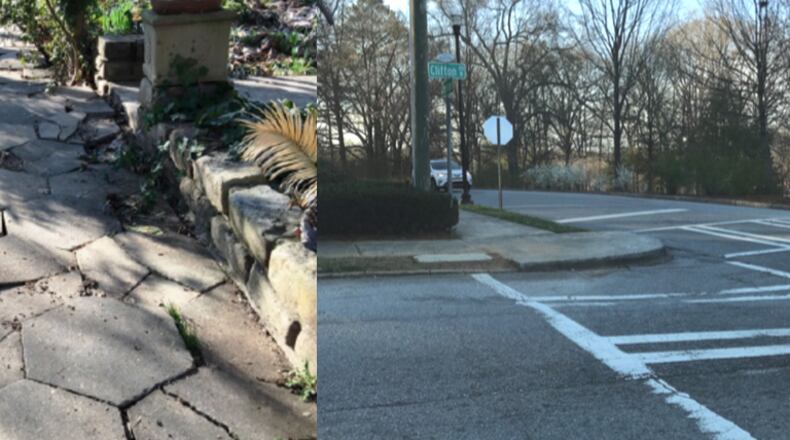Atlanta officials have agreed to pay a settlement in a years-long federal lawsuit that accused the city of purposefully overlooking Americans with Disabilities Act requirements for disabled residents trying to navigate neglected streets.
City Council members went into executive session last week to privately discuss details of the $1.6 million settlement agreement, known as a consent decree, which includes both cash damages and a commitment to correct issues over the next 25 years.
Three residents with disabilities filed the class-action lawsuit in 2018 on behalf of wheelchair users and others who struggle to traverse Atlanta’s broken sidewalks, intersections with no curb ramps and other obstacles.
“This is not merely the result of a few sidewalks having fallen into disrepair,” the complaint reads. “This is the result of a systemic, knowing failure by the City to maintain its public rights of way, on the whole, in a manner to ensure that they are equally accessible to people with mobility impairments.”
The settlement passed by City Council last week is broken into three chunks: $600,000 cash to settle the claim, $625,000 to oversee compliance, and $370,000 over 25 years to pay consultants to track progress.
City lawmakers said the lack of money in the settlement for construction is a result of millions of dollars already dedicated to projects the city will fund through TSPLOST and bond programs.
Atlanta’s recently formed Department of Transportation will also shoulder a large burden in the consent decree. The department will be required to do an evaluation of the accessibility of the city’s sidewalks and hire an ADA coordinator.
The city declined comment on the settlement, saying the agreement still has to be approved by a judge.
But this is not the first time Atlanta has been in legal trouble for disregarding national standards for ADA compliance. The city has faced pressure to address issues for decades.
Years of issues
Current council members who are working to pour funds toward the city’s neglected infrastructure say that they feel they’ve been stuck playing catch-up to make the city easier to navigate.
Council member Dustin Hillis, who sponsored the settlement legislation on behalf of the public safety committee, said that there are many resurfacing projects from voter-approved sales taxes and bond programs that haven’t gotten off the ground yet.
“A lot of improvements are already slated whether it’s, unfortunately, the TSPLOST and Renew Atlanta from eight years ago, projects that are still awaiting construction,” he said. “And then in anticipation in this lawsuit there were a lot more sidewalk projects and funds dedicated in TSLPOST 2.0 and Moving Atlanta Forward.”
Hillis also sponsored recently passed legislation that allocates an additional $12 million of general fund money to new roadway initiatives after, he said, construction halted for about two years under the Keisha Lance Bottoms administration.
Each council district this upcoming year will now receive $1.5 million for resurfacing projects as compared to $500,000 in prior budgets, Hillis said.
“So any of those resurfacing projects that are already-existing sidewalks will be restored if they have ADA violations — crumbles or some of them uneven — and a lot of ADA ramps are out of compliance so those will all get refreshed,” he said.
Problems with ADA compliance go back long before the 2018 lawsuit — to Mayor Shirley Franklin’s administration.
In 2009, the city came under fire by the U.S. Department of Justice after it fell far below the standards on a nationwide audit for improving access for residents with disabilities. The result was an extensive agreement that required the city to make big changes — from necessary physical improvements of public spaces to making emergency services more accessible for residents with disabilities.
The 2018 lawsuit argued that the city did not meet the requirements of the deal after city officials testified at the time they hadn’t implemented programs like a hotline for residents to report trouble areas.
A 2010 report citied in the lawsuit found that, of Atlanta’s intersections that hadn’t been repaved since 1992, more than 15,800 weren’t compliant with ADA standards or had no wheelchair ramps at all. That was compared to only 3,000 that were up to par.
Atlanta’s settlement in the case brought by residents in 2018 falls far short of what some other cities have had to commit to repairing sidewalks.
In 2015, Los Angeles agreed to pay more than $1.4 billion to bring its streets up to ADA compliance. The city of Portland also settled a similar suit five years ago which required it to spend $113 million on sidewalks.
Lawyers representing plaintiff’s in the lawsuit declined comment pending court action on the settlement.
About the Author
Keep Reading
The Latest
Featured



